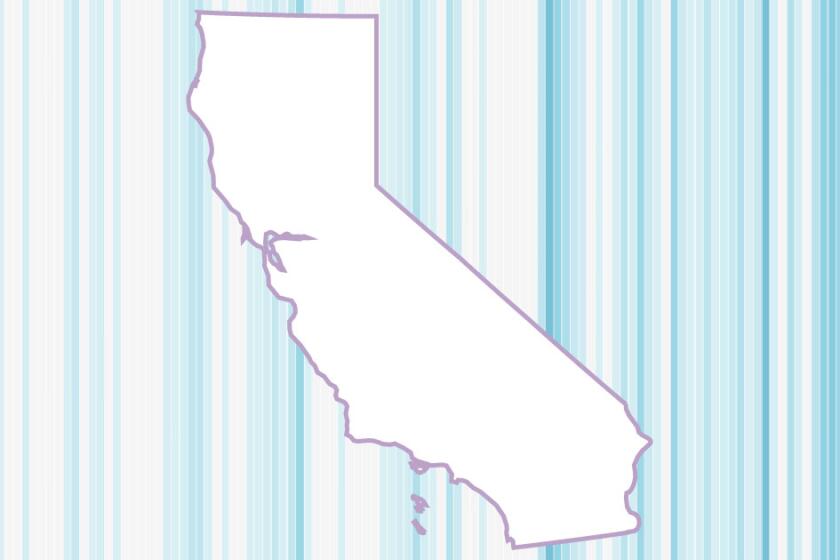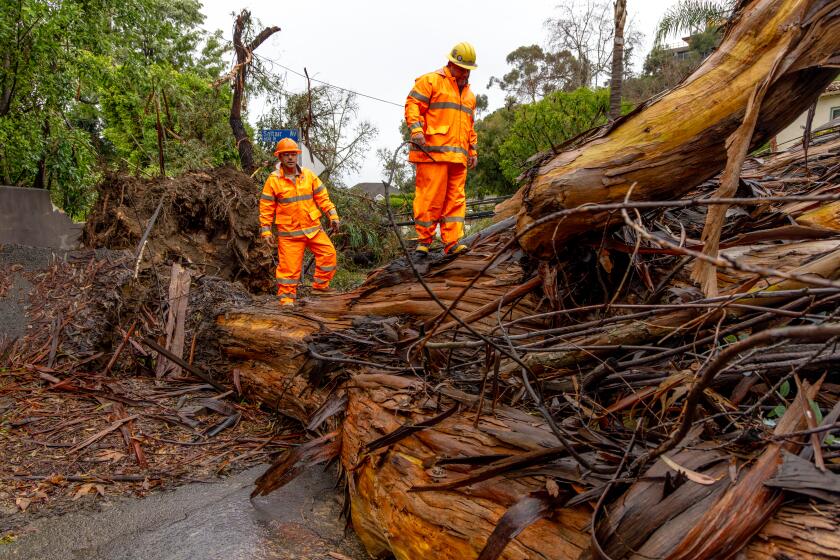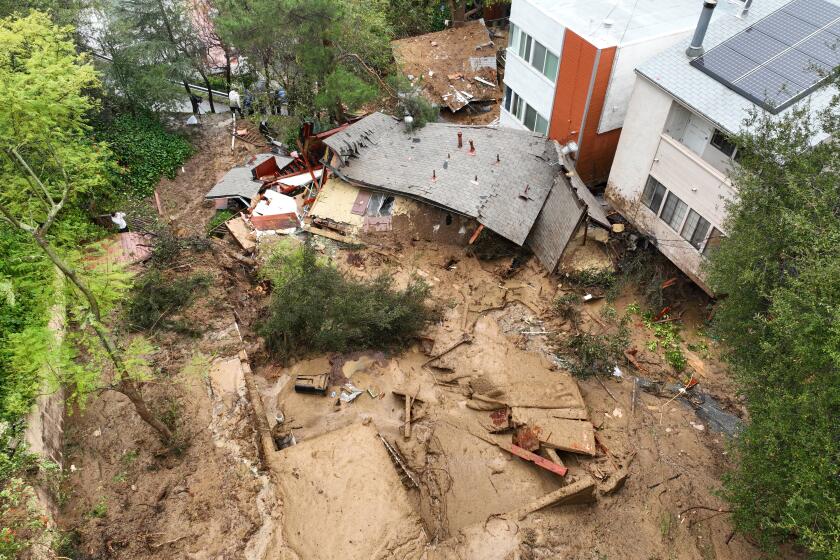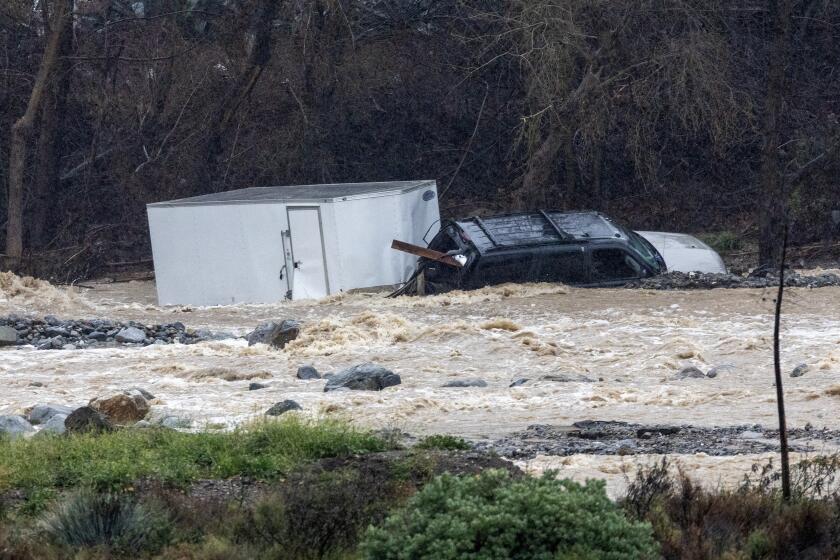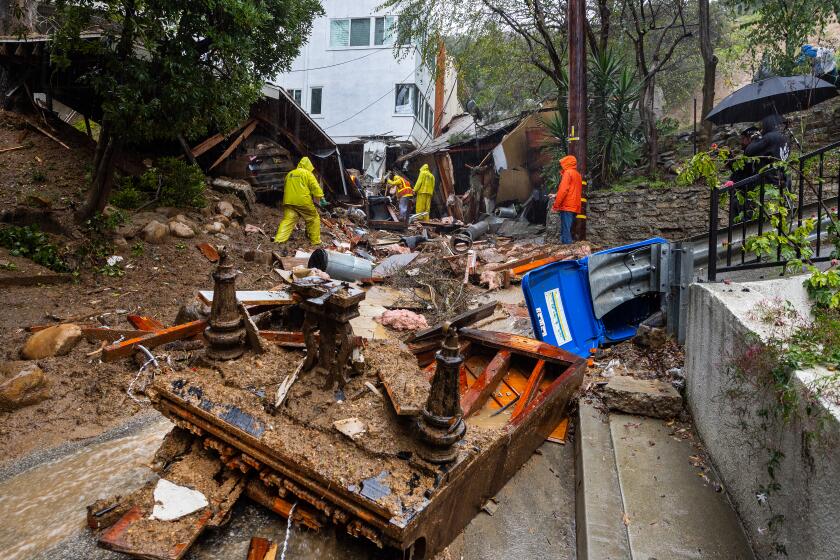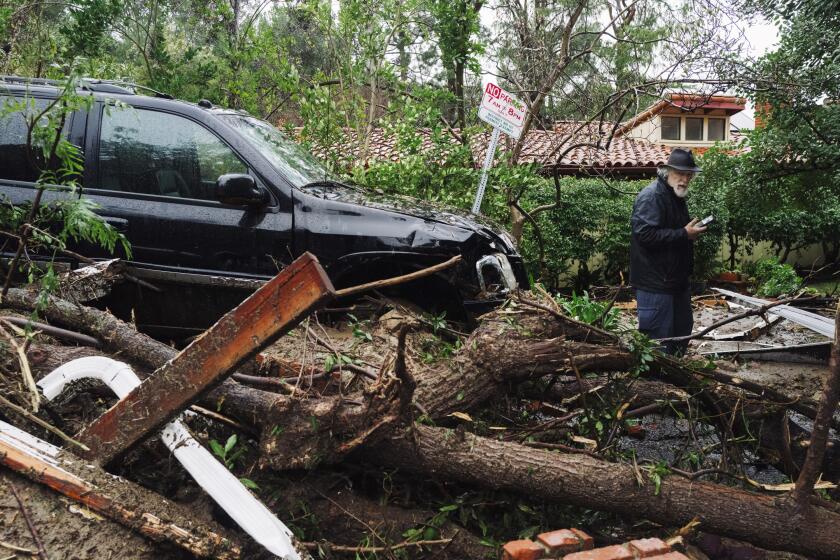Death toll at 9 as storm destruction mounts in Southern California
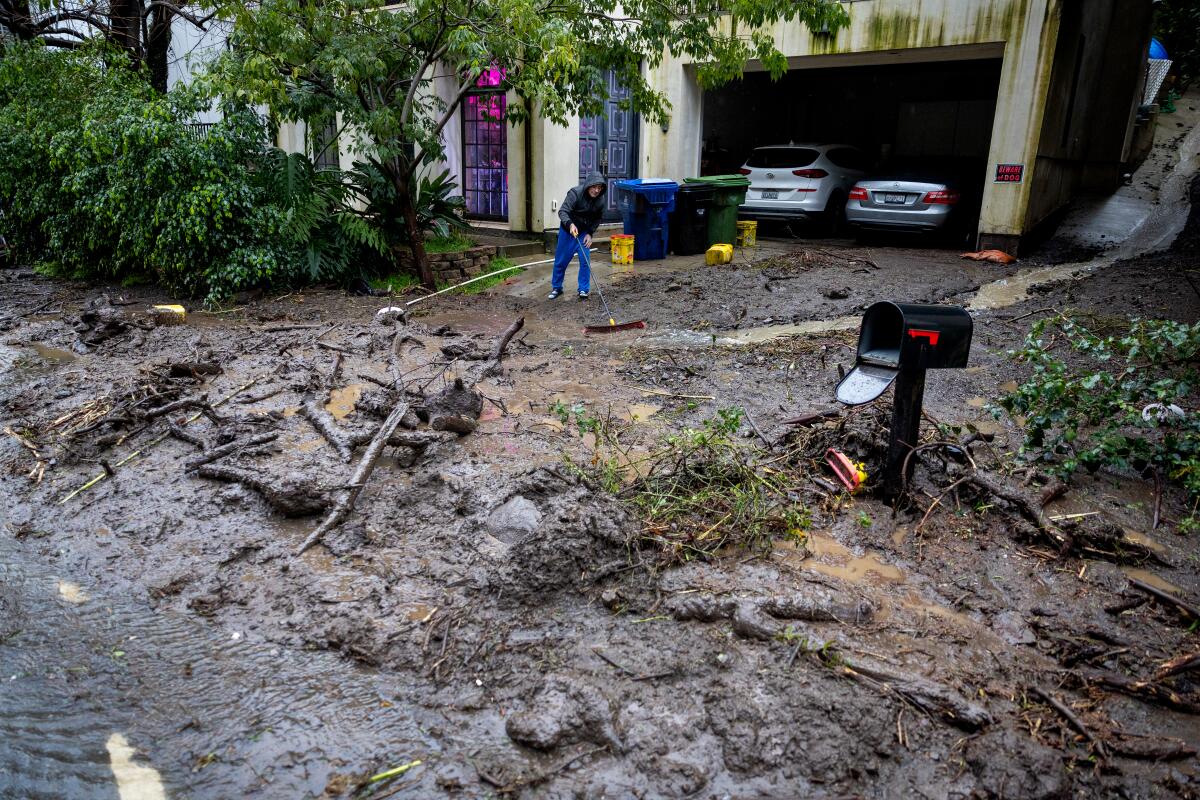
- Share via
Rainfall from a deadly atmospheric river storm has already smashed records in Southern California, but the severe weather did not let up Tuesday as more mud and debris flows inundated roads and forced evacuations.
The death toll from the storm climbed to nine, and included the first storm-related deaths in Southern California. Officials are concerned the number could grow once the water recedes.
That could take days, though, officials said, as rain was expected to persist across the Southland through at least Wednesday, with some heavy precipitation still possible.
“Do not let your guard down,” Ariel Cohen, a National Weather Service meteorologist in Oxnard, said Tuesday during a briefing in Los Angeles. “There could still be some very significant impacts.”
It will take “very little additional rain” to cause increased flooding or mudslides and debris flows, he said, as played out Tuesday in Hacienda Heights and La Habra Heights in east Los Angeles County. They were the latest hilly communities to see devastating damage from the historic rainfall.
As Californians face non-stop rain from an atmospheric river this week see how rainfall totals in your area compares to other regions and previous years.
Firefighters on Tuesday morning evacuated three homes on Gotera Drive in Hacienda Heights after back-to-back debris flows damaged at least one house and left two others unsafe, Los Angeles County Fire Department spokesperson Christian Reynoso said.
No one was injured, but “we’re still keeping an eye on the hillside,” Reynoso said, hours after the land gave way. “There’s still some potential that there is more mud that comes down. We’re still expecting a little bit more rain, so we’re on standby.”
In her 40 years in Hacienda Heights, Deann Rankin, who lives not far from Tuesday’s mudslides, said she had experienced many strong storms but never a mudslide in her neighborhood.
There’s been “nothing like this magnitude” of rain, saturating the hillside “to where there is concern of the hill coming down,” the 58-year-old said. “We’ve never seen anything like that.”
Nearby, an almost three-mile stretch of Hacienda Road in La Habra Heights was closed after a major debris flow swallowed much of the street.
Capt. Greg Terrill of the La Habra Heights Fire Department said crews were responding all morning to various mudslides and debris flows, mostly affecting roadways.
When asked how many slides had been reported, Terrill said, “Not one or two, more like 15-plus.”
On Tuesday, officials also warned of a possible tornado in San Diego County as winds gusted across the region. Several flash flood alerts were issued as heavy bands of rain moved through.
But by Tuesday evening, officials were hoping the worst of the storm had passed.
The system has left a trail of destruction across the region and the state, with widespread power outages, road closures and flooding, as well as hundreds of mudslides that, in some cases, ruined homes and forced evacuations in Hollywood Hills, Studio City and other parts of Los Angeles County.
The death toll from the storm rose, with state officials confirming late Tuesday at least nine fatalities across California.
In addition to the three men who were killed by fallen trees in Northern California on Sunday, Brian Ferguson, a spokesperson for the governor’s Office of Emergency Services, said an additional person died of injuries from a fallen tree Saturday, in Sacramento County. He did not have further details on that death, or many of the others.
Three were killed in car wrecks, including one person who hydroplaned Thursday in San Mateo County, Ferguson said, and two who died Monday while driving in Southern California, possibly referring to incidents in Riverside and San Bernardino counties.
In the San Bernardino County city of Yucaipa, inclement weather caused a driver to lose control of his vehicle Monday, sending the pickup truck into an embankment, submerging the vehicle, according to California Highway Patrol Officer Ivan Sandoval. The 69-year-old San Bernardino man was transported to a hospital, where he died of his injuries.
In Riverside County, three cars crashed Monday in Moreno Valley, sending one vehicle into a flood control channel, where a driver was swept away, according to Riverside County Sheriff’s Sgt. Marcos Acosta. The driver was later found miles away in the water and pronounced dead.
The storm fed off of unusually warm waters as it grew. It also reached “bomb cyclone” status as it neared California.
Ferguson said there was a storm-related death in San Luis Opispo County of a 90-year-old in hospice care, though it wasn’t immediately clear how the death was linked to the storm.
And Ferguson said a man died Tuesday in the Tijuana River in San Diego County.
He did not have further details or the identities of those who died.
On Sunday, three people in Northern California were killed by falling trees, according to state and local officials, as the storm initially hit the state with extremely high winds, especially in the coastal mountains — with gusts up to 90 mph and, in one case, over 100 mph.
Chad Ensey, 41, of Carmichael, in Sacramento County, suffered blunt-force trauma and died at a hospital after a tree fell on him in his backyard amid strong winds. In the rural Santa Cruz County community of Boulder Creek, Robert Brainard III, 45, was killed when a tree fell on his home. And in Sutter County, 82-year-old David Gomes was found dead beneath a fallen redwood tree in his backyard, authorities said.
Tuesday afternoon, rain totals continued to rise across Southern California. Some areas in the Santa Monica and San Gabriel mountains topped 13 inches, including at Lytle Creek (13.6) and the Cogswell Reservoir north of Monrovia (13.15), according to the National Weather Service, and several spots hit 12 inches.
Southern California rain totals from the last five days topped 14 inches in some areas, easily besting the average for the entire month of February.
Rainfall totals in the Santa Monica Mountains, the region largely considered the hardest hit by the storm, have averaged 7 to 12 inches since Sunday, according to the weather service.
Evacuation orders that had been in place through late Tuesday for parts of Shadow Hills, Topanga and near Agua Dulce were downgraded to warnings, though officials noted that areas near wildfire burn scars would remain vulnerable.
The storm prompted a state-of-emergency declaration from Gov. Gavin Newsom, and Los Angeles Mayor Karen Bass signed a declaration of a local emergency Monday to help the city respond to the storm.
Bass said Tuesday morning that more than 7,000 residents remained without power, noting that the city’s Department of Water and Power had restored electricity to 54,000. About 5,000 Southern California Edison customers were also still without power.
As of Tuesday evening, Pacific Gas & Electric, the state’s largest utility, said about 110,000 customers remained in the dark statewide.
The rainfall has been record-smashing across Southern California, with nearly half the average seasonal rainfall falling in just two days, on Sunday and Monday, officials said.
“Rainfall in downtown Los Angeles on the 4th and the 5th [of February] totaled 7.03 inches,” an analysis from the National Weather Service said. “That is the third wettest consecutive two-day total since official weather records began in 1877 ... and the highest two-day rainfall total for the month of February.”
As of late Monday, Los Angeles authorities had responded to more than 475 mudslides, with 38 homes or buildings damaged by debris flows, including four that were deemed unsafe to enter.
Here are areas in L.A., Ventura, Orange, San Bernardino and Santa Barbara counties with evacuation orders or warnings in place.
Los Angeles Fire Chief Kristin Crowley said Tuesday that crews remained active. She urged Angelenos to stay away from roaring rivers and washes after crews rescued a man from the L.A. River who jumped in to try to save his dog.
“The banks of the river are not the place to be during the storm,” Crowley said, noting that local rivers are still flowing with “high intensity.”
Speaking at Tuesday’s meeting of the Police Commission, LAPD Chief Michel Moore said that emergency responders were called to 136 storm-related incidents that resulted in an injury. The number of collisions peaked on Sunday, Moore said, though he noted there have been no traffic deaths.
All Los Angeles Unified schools were open for classes Tuesday except for Vinedale College Preparatory Academy and Topanga Elementary Charter School, which were affected by evacuation orders or continued hazards. But Tuesday night, school officials announced Vinedale would reopen Wednesday. The Topanga charter school remains closed; students are being asked to report for class at Woodland Hills Academy, about 10 miles away.
Public schools in Malibu, which were closed Tuesday, also were expected to reopen Wednesday. In Santa Barbara County, most public schools reopened Tuesday after being closed Monday, the county education office reported.
Along the Santa Barbara coast, firefighters in Isla Vista on Tuesday evacuated multiple apartment units because of cliff erosion as a coastal flood advisory and high surf advisory remained in effect through Friday. County Supervisor Laura Capps said all 45 residents displaced were UC Santa Barbara students.
The atmospheric river parked over Southern California has caused devastating debris flows in posh neighborhoods in the region’s canyons and hillsides.
The San Diego River at Fashion Valley was again forecast to overflow its banks, with the latest projections from the California Nevada River Forecast Center showing it cresting Tuesday afternoon. Weather officials expected flooding around the river, near Fashion Valley mall.
Rain will continue through Wednesday, with the heaviest amounts south and east of Los Angeles, especially in San Diego County, where an additional 3 inches of rain could fall, particularly in the mountains.
In San Bernardino County, evacuation warnings were still in place for Forest Falls, Angelus Oaks, Seven Oaks and Barton Flats. On Mt. Baldy, rescue teams continued to look for Ada Huang, a hiker who didn’t return home Sunday.
“They will search as long as conditions are safe to do so,” San Bernardino County sheriff’s spokesperson Mara Rodriguez said of efforts to find Huang.
Winter weather advisories were still in effect over the mountains of San Bernardino, Riverside and Los Angeles counties, where snowfall could accumulate up to 3 feet.
Heavy snow was falling at elevations as low as 4,000 feet Tuesday in Big Bear City, and snow levels could remain low through Wednesday, with an additional 6 inches to a foot possible in the mountain communities.
Times staff writers Hayley Smith, Libor Jany, Howard Blume, Noah Goldberg and Dakota Smith contributed to this report.
More to Read
Sign up for Essential California
The most important California stories and recommendations in your inbox every morning.
You may occasionally receive promotional content from the Los Angeles Times.
